According to 16th century superstition, a witch had to be practically weightless to be able to fly around on a broomstick. Thus the practice of weighing women accused of being witches sprang up. But the weigh masters often took bribes to find a woman guilty. In one such case in 1545, Emperor Charles V brought a convicted witch to Oudewater to be re-weighed. There she was found to weigh more than 100 pounds and was therefore acquitted. In appreciation for the honest weight, Charles V granted the town the privilege of issuing certificates that cleared a person of witchcraft. Because it was the only place in Europe where the weighing was done honestly and publicly, Oudewater became the destination for many women in Europe.

The Oudewater Weigh House |
The town was very pretty, with beautiful 17th century gabled houses and some lovely canals. We made a point of having each of us properly weighed at the Weigh House (Waag) and issued a Certificate of Proof of Innocence of Witchcraft. (For the record, our weights were: Darrell 140; Jane 110; Larry 120; Dennis 94; Randall 74; Kevin 62.)
It was only a few miles to Gouda, famous for its red-wax-covered cheese. We enjoyed the Grote Markt
there, with its picturesque Gothic Stadhuis (1450), and the Weigh House (1668), where the Thursday cheese market is held. We also visited St. John’s Church, noted for its dozens of stained glass windows dating back to the 16th century.
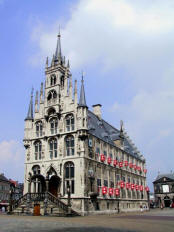
Gouda Town Hall | 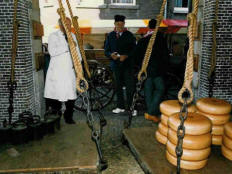
Weighing the cheese | 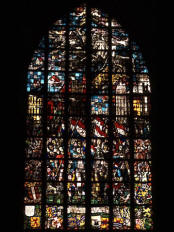
Window in St. John's |
Our next stop was Delft, renowned for its distinctive blue-on-white porcelain and tiles. We strolled around the old town, starting in the Grote Markt. The Stadhuis was more elaborate than the others we’d seen and was quite beautiful. The whole town was very picturesque with many old buildings, cobblestones, and canals. It must look much the way it did when Vermeer painted here in the 17th century. Back at the Grote Markt, we bought a few pieces of Royal Delft as souvenirs. Then it was on to The Hague.
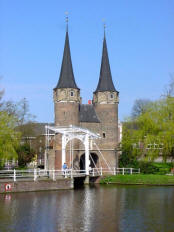
Oostpoort (East Gate) | 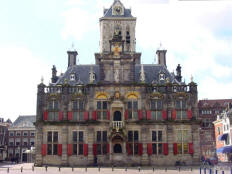
Delft Town Hall | 
A canal in Delft |
We had lunch along the way.
Then, as a treat for the boys, we dropped them off at the beach in Schevenigen while we checked into the Hotel Roodbol in the embassy district. It had probably been a big private mansion in its day, and our room was very large (the boy’s less so).
We rushed to tour the Binnenhof while the boys were still at the beach. The Binnenhof (1790) is the seat of government in that the Parliament, the Prime Minister, and the Supreme Court are located there. Today “Binnenhof” is used to refer to a complex of several buildings, but originally it was only the square around the Knights’ Hall (Ridderzaal) (1248). The oak ceiling in the Hall was fantastic.
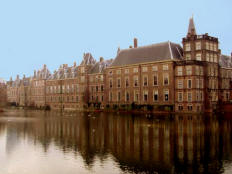
The Binnenhof | 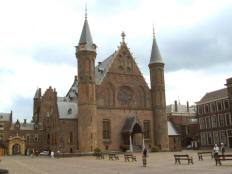
Knights' Hall | 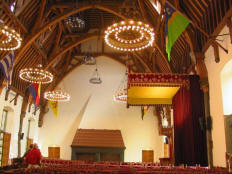
Inside Knights' Hall |

Jane & Randall explore Madurodam |
We picked up the boys in Schevenigen at 1730, as prearranged, then took them to nearby Madurodam (1952). This is a complete Dutch city in miniature (scale 1=25), complete with railroads, an airport, roads, rivers (with fire boats), and canals. Many famous structures are represented, too, including the Binnenhof, the Peace Palace, Rotterdam’s Euromast, and even the Sassenpoort from Zwolle. Needless to say, the boys were thrilled. They all ran in different directions, going from one thing to another, and calling to each other to come see what they’d found.
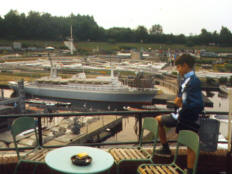
Randall looks over the harbor | 
Knights' Hall & royal carriage | 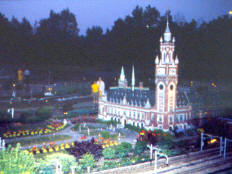
The Peace Palace at dusk |
We had deliberately planned to get to Madurodam late in the day because
I had read about the spectacular lighting after dark. It was still light, though, when the boys had all explored every corner of the miniature town, so we had dinner at the restaurant on the grounds. By the time we finished, it was almost dusk and the lights came on. We all went back through the display, but more quickly this time. Then it was back to the hotel for the night.
Page 1 2 3 4 5 6 7
Home
Copyright © 2000-2023 DarrellPeck.com All rights
reserved.